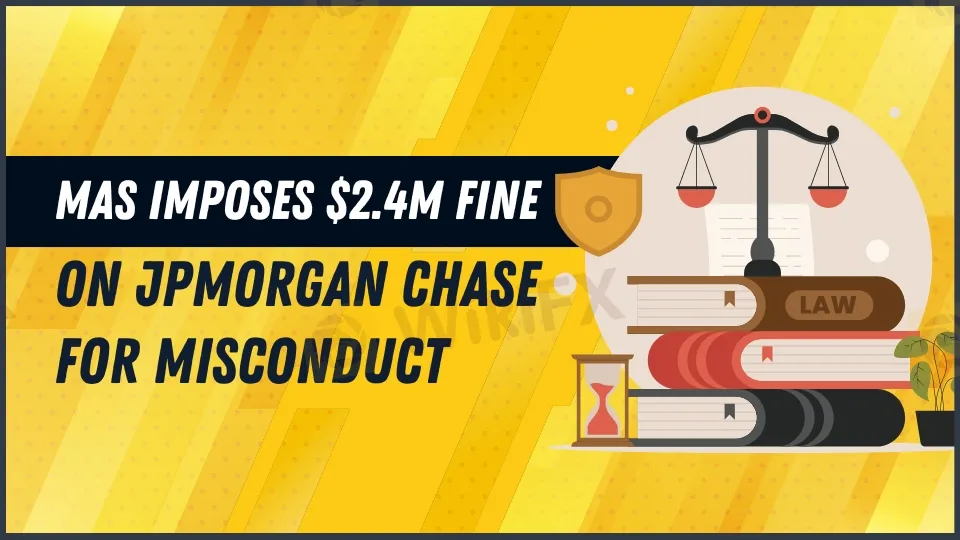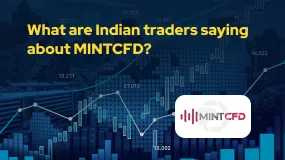简体中文
繁體中文
English
Pусский
日本語
ภาษาไทย
Tiếng Việt
Bahasa Indonesia
Español
हिन्दी
Filippiiniläinen
Français
Deutsch
Português
Türkçe
한국어
العربية
MAS Imposes $2.4M Fine on JPMorgan Chase for Misconduct
Abstract:JPMorgan Chase is fined $2.4 million by MAS for overcharging clients on OTC bond trades, misrepresenting spreads, and unethical actions by relationship managers.

The Monetary Authority of Singapore (MAS) fined JPMorgan Chase $2.4 million for claims of fraud by its relationship managers (RMs) in over-the-counter (OTC) bond transactions. The penalties derive from the bank's inability to provide appropriate pricing to clients, which resulted in overcharging owing to inflated spreads over the agreed-upon rate.
JPM's Misconduct: Charging Unfair Spreads
According to MAS's inquiry, JPMorgan charged clients a spread above interbank rates for OTC bond trades. Clients who could not access interbank pricing for themselves had to rely on RMs' representations of rates and spreads. In other circumstances, JPMorgan failed to prevent or identify inappropriate disclosures by its RMs.
An examination of 24 OTC bond transactions revealed that RMs either misrepresented the price components or omitted critical information, resulting in customers being paid more than the agreed-upon rates. These activities violated Sections 201(c) and (d) of the Securities and Futures Act.

Bank Admits Liability and Refunded Clients
JPMorgan Chase has accepted responsibility under Section 236C of the SFA for failing to notice misbehavior. The bank has repaid the inflated fees to impacted customers and strengthened its internal controls and pricing structures to prevent future problems. Separate investigations are also being conducted for each of the RMs concerned.
MASs Commitment to Industry Integrity
This fine is part of the MAS's continuing assessment of pricing and disclosure practices in the private banking business, which seeks to ensure openness and fairness. The authority stressed the significance of effective controls in banks to avoid such misbehavior, emphasizing the need for responsibility in financial activities.
Final Thoughts
This penalty sends a strong message to financial institutions that openness and adherence to agreed-upon agreements are critical to retaining client trust. JPMorgan Chase's quick action to refund overcharges and tighten internal controls demonstrates its commitment to respecting industry standards. However, the ongoing investigations into individual RMs highlight the necessity for continual monitoring in the banking industry.

Disclaimer:
The views in this article only represent the author's personal views, and do not constitute investment advice on this platform. This platform does not guarantee the accuracy, completeness and timeliness of the information in the article, and will not be liable for any loss caused by the use of or reliance on the information in the article.
Read more

SkyLine Judge Community: Appreciation Dinner Successfully Held in Malaysia
On August 1, 2025, the SkyLine Judge Appreciation Dinner was successfully held in Kuala Lumpur, Malaysia. As the first WikiFX SkyLine event in Malaysia this year, the dinner not only aimed to express sincere gratitude to expert judges, partners, and industry representatives who have long supported the development of the SkyLine Judge Community but also facilitated in-depth discussions on the future direction of forex trading safety, financial education, and industry transparency.

AssetsFX Scam Alert: 5 Troubling Signs
Forex trading has become a critical game now because of advancements in technology. Due to this Unfortunately, scam brokers have also entered in the Forex market. Therefore, you need to stay alert. This article aims to warn all traders and investors. Read carefully and stay aware.

Forex4Money: Where Your Money Goes In, But Never Comes Out!
Discover how Forex4Money traps investors with fake profit promises and blocked withdrawals. Read real complaints and protect yourself from this unregulated forex scam.

What are Indian Traders saying about MINTCFD?
MINTCFD is an India-based broker. It's important to note that independent watchdogs have issued scam alerts against the broker. They label MintCFD as risky and possibly fraudulent. In this Article, we will tell you the red flags of MINTCFD to protect your money
WikiFX Broker
Latest News
Euro zone inflation holds steady at higher-than-expected 2% in July
Forex Success Stories: Lessons You Can Use to Win
Scam Alert: FCA Issued Warning! Check the List of Unauthorized Brokers Below!
FCA Forex Trading Regulations Explained – What Every Trader and Broker Must Know
FIBO Group: A Closer Look at Its Licenses
Making Money with Forex Weekend Trading
FCA Issues New Alerts Against Unlicensed Financial Platforms, Including Clone Scams
The Untold Story In Today's Jobs Report: The Unprecedented Purge Of Illegal Alien Workers
Aetos relinquishes FCA license to focus on Australia, offshore
Scam Surge in Sarawak: Losses Soar to RM77.7 Million in Just 7 Months
Currency Calculator


